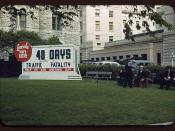Indonesia has a relatively open foreign investment regime and looks to foreign investment to help the country out of the current economic crisis. It has established a niche for low-cost manufacturing, which would be beneficial for Lincoln. The new government has been transforming Indonesia into a country with one of the most liberal policy and regulatory frameworks for investments in Southeast Asia (http://www.us-asean.org/Indonesia/business_guide/foreign_direct_investment.asp). However, Indonesia is characterized by the instability and inefficiency of democratic institutions and deep-settled corruption that may have a great impact on investing in the country.
Here is an analysis of fit of four major elements of Lincoln's Management Control System to Indonesia's business climate:
Flexible Work Practices
The Indonesian law (Law No.1/1951 on the Working Period and Break Times) states that workers are not allowed to work more than seven hours per day or 40 hours per week, with one 30-minute rest period for each 4 hours of work.
The law also requires one day of rest weekly. The daily overtime rate is 1-1/2 times the normal hourly rate for the first hour, and twice the hourly rate for additional overtime. Employer violations of legal requirements are fairly common and often result in strikes and employee protests (www.europarl.eu.int/hearings/sc1b/soclause/doc5_en.htm).
Also, there is an extreme proliferation of labor unions; at present there are at least 64 labor unions, in the forms of federations or confederations and at the company-level. Workers are becoming more and more open in expressing their interests, which is causing an increase in the number of strikes. Manpower Ministry's official data listed 177 industrial labor strikes in 1997, and 70% of this occurred in Jakarta (http://www.sweatshops-retail.org/NRF%20Website/indonesia.htm).
Lincoln Way is characterized as highly flexible, that is, the management has the authority to transfer workers and to switch between overtime and short time as required, and to...


![[Abraham Lincoln, Congressman-elect from Illinois. Three-quarter length portrait, seated, facing front] (LOC)](https://s.writework.com/uploads/7/77419/abraham-lincoln-congressman-elect-illinois-three-quarter-le-thumb.jpg)